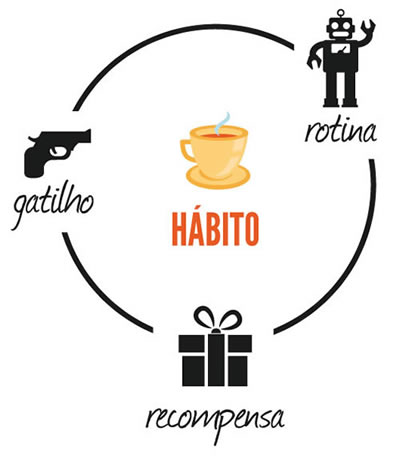This book “The Power of Habit – why we do what we do in life and in business“, Charles Duhigg, published in Brazil by Editora Lens, is a work that must be read by those who seek self-knowledge and development based on scientific sphere and not philosophical or spiritual. I say this because the author has studied several distinct cases, involving different human behaviors, to conclude that the habits are and how we can change them.
I confess that at first reading adopted a skeptical stance toward the “case studies” cited by the author during the narrative, they did not know any of the examples and I immediately thought they were fictitious, that were in the book just to convince myself of the truths found by Duhigg. Despite this skepticism, I continued reading and did not regret, because in the middle of the book cases that brought me the line of reasoning of the author are cited, as swimmer Michael Phelps, the greatest medalist of Olympic history, which created a warm-up routine before jumping in the pool, where each exercise is completed a small victory, and that the sum of these victories always led to the top of the podium.
What is the Habit?
After reading this book, I understand now that the habit is a normal behavior of any individual and we all have good habits and bad habits. I understand that the habit is something we do not we use all the functions of our brain. It's something we do for we are already accustomed to a certain situation.
The Brain optimizes our tasks
The habits, scientists say, arise because the brain is constantly looking for ways to save effort.
When reading the book you will realize that the habit arises when your brain optimizes the processing of information and creates a specific routine for an ordinary activity.
Most of us do not think to put up with your right hand or left toothpaste on brush, if you first brush your teeth above or below, or if you first calçamos the right foot and then the left. We simply do these activities without paying much attention to our actions, because our brain recognizes what needs to be done and that activity triggers the habit.
When a habit arises, the brain to participate fully in decision-making. He stops making so much effort, or divert the focus to other tasks.
The habit is a behavior triggered by our brain power to economizarmos, because, if we needed all the brain power to run all our activities, fraud we would necessarily going mental before the time of almoço, and that would not be cool.
Trigger, Routine and Reward

Source: mude.nu/metas-2014-objetivos-passos /
Charles Duhigg summarizes the habit in three phases:
- Trigger: is what triggers the habit. The brain detects a pattern or a suggestion and activates the habit to stay free and perform other functions;
- Routine: is pre-programmed by the brain to trigger behavior to meet the habit. It is the sequence of actions that begin to perform automatically, without thinking much about them;
- Reward: is what we look for when the habit is triggered and is usually associated with a feeling of pleasure, of accomplishment, satiety or realization.
The addiction can be considered a habit. A cigarette addict, when the body senses the drop in the level of nicotine, the brain triggers the trigger of smoking. The routine starts the behavior of light a cigarette in search of the feeling of pleasure, reward, that is increased levels of nicotine in the body.
Changing your habits
Changing a habit is not an easy task, but it is not impossible. Understanding which trigger a habit you can change the routine or replace the reward.
The author gives an example of a very interesting habits of their own which is to stand in the middle of the workday and eat cookies in the cafeteria. This he did every day and was leaving increasingly fatter. By analyzing the habit, he realized that the trigger was not hunger nor the reward of euphoria caused by the increased level of insulin (sugar) no sangue, but by the need to chat with someone to relax a little job strain. Knowing said he stopped eating cookies and now disturb your colleagues for a 10 minutes. (Who ever received at his desk a coworker who wants to make small talk? And just at the time you most need to concentrate! #QuemNunca!)
The habits never desaparecem handful of.
The villain of the habit change is that the old habit never disappears completely. When we want to create the habit of going to the gym to improve our health, the habit of leaving work and going home will always remind you that it is much more rewarding to stay on the couch watching TV than sweating on a treadmill. Perseverance and focus on new reward, to improve their health, will have to be more powerful to supplant the old habit.
Conclusion
I learned a lot from this book and managed to change a very bad habit I had: The stay “cutucando” from each bad. Funny that there is a passage from the book that deals exactly with this example and, in my case, worked very well. Whenever I read a book or stood still doing nothing (trigger), get into the habit of poking nails were driven to compensate for pomp than fazer (reward). It seems a very silly thing, but changed the routine giving only three hits with finger anywhere to remember: “Change esse habit and stop getting your nails poking”.
Worked very well in my case and now I try to apply what I learned from the book in my day-to-day, analyzing my bad habits and trying to improve them.
If you want to learn more about yourself, recommend buy the book The Power of Habit and learn how to create good habits and eliminate the bad. No easy task, but reading will show you what is possible.
Se, before you buy the book, you want to know more about it, recommend watch the video and read the summary prepared by Arata Seiiti for the course Productivity Ninja. I did this course and, coincidentally, I finished reading the book at the exact moment that the subject was treated in video classes.
So that's. I hope this review has convinced you to start reading The Power of Habit and that is the trigger for you to evolve more and create many good habits in your life! If you like what you read, tell a friend and help to also improve his habits.










Pingback: Learning Student Nº05: Motivation and Discipline | Particionando